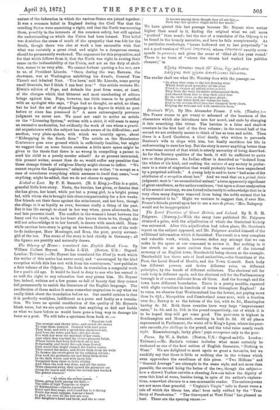The Odyssey of Home •: translated into English Blank Verse.
By
William Cullent Bryant. Books (Boston, U.S.: Osgood. London : Triiimer.)—Mr. Bryant has translated the Iliad (a work which the writer of this notice has never seen), and "encouraged by the kind reception which this has met with from his countrymen," now publishes a first volume of the Odyssey. He finds in translation a congenial work for a poet's old age. It would be hard to deny to one who has earned it so well the right to any relaxation that may please him. Mr. Bryant has, indeed, written not a few poems so full of beauty that they cannot fail permanently to enrich the literature of the English language. The recollection of these makes it seem somewhat ungracious to say what we really think about the translation before us. Our candid opinion is that it is perfectly worthless, indifferent as a poem and faulty as a transla- tion. We have no special recollection of the quality of Mr. Bryant's blank verse, but we are quite certain that anything so dull and feeble as what we have before us would have gone a long way to damage his fame as a poet. We will take a specimen from book vi. :— " Nausicaa took The scourge and showy reins, and struck the mules To urge them onward. Onward with loud noise They went, and with a speed that slackened not, And bore the robes and ber,—yet not alone, For with her went the maidens of her train. And when they reached the river's pleasant brink, Where lavers had been hollowed out to last Perpetually, and freely through them flowed Pure water that might cleanse the foulest stains, They loosed the mules, and drove them from the wain To browse the sweet grass by the eddying stream ; Now took the garments out and flung them down In the dark water, and with hasty feet
Trampled them there in frolic rivalry. And when the task was done, and all the stains Were cleansed away, they spread the garments out Along the beach and where the stream had washed The gravel cleanest."
. . . .....
"As when the archer-queeu
Diana, going forth among the hills,—
The sides of high Taygetus or slopes Of Drymanthus,—chases joyously Boars and fleet stags, and round her in a throng Frolic the rural nymphs, Latona's heart Is glad, for over all the rest are seen
Her daughter's head and brow, and she at once
Is known among them though they all are fair,— Such was this spotless virgin midst her maids."
We have quoted this last passage because Mr. Bryant rises rather higher than usual in it, finding the original what we call more "poetical " than usual ; but the test of a translator of the Odyssey is to be found in the homely narrative, and here he fails conspicuously. As to particular renderings, "lavers hollowed out to last perpetually " is not a good version of ,r*Xuvoi kr;emvoi, where lavravoi exactly corre- sponds to perennis, and gives the sense of ' filled all the year round.' There is no trace of "where the stream had washed the pebbles cleanest," in
B,e172; Irirctetty Irapa AN iiXo;, Tx, p.taierce
Arify a; Tod yEpeov eicro;TXLyetrze Oti?Lctotrct.
The reader shall see what Mr. Worsley does with the passage :-
" so when they came to the fair-flowing river
Which feeds good lavatories all the year, Fitted to cleanse all sullied robes soever, They from the wain the males unharnessed there, And chased them free to crop their juicy faro By the swift river, on the margent green; Then to the water dark the vestments bare, And in the stream-filled trenches stamped them clean, Helping the welcome toil with emulation keen."


































 Previous page
Previous page